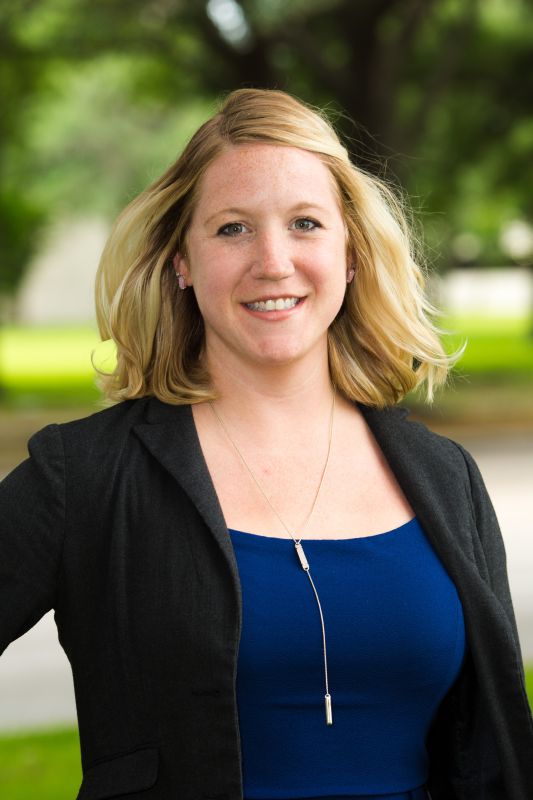For Cullen College of Engineering doctoral student Cynthia V. Castro, growing up on the Gulf Coast and seeing how devastating the storms can be has fueled her educational pursuits, and also led her to being earning a scholarship from the Texas Section of the American Water Works Association for the 2020-21 academic year.
Castro, who’s working with Dr. Hanadi S. Rifai – the John and Rebecca Moores Professor of Civil and Environmental Engineering – was also chosen for the scholarship in 2019-20. Castro received her B.S. in Civil Engineering from Texas A&M in 2011 and her Masters in Civil Engineering from the University of Texas in 2016, but decided to attend UH after working for a private firm.
“When Hurricane Harvey affected our community, I decided it was time to pursue my lifelong goal of a full-time career in academia,” she said. “I wanted to help the City of Houston with comprehensive, high-level water planning. My goal is to pursue a tenure-track faculty position where I will be involved in cutting-edge research while mentoring the next generation of problem-solvers through real-world experience and latest technologies.”
Castro described her work as focusing on the intersection of society and Earth sciences, particularly issues of flooding and environmental contamination.
“I research how humans interact with and impact such systems in addition to providing mitigation strategies for reducing such impacts,” she said.
Her current research involves investigating regional flood mitigation scenarios and their impacts from catastrophic storm events throughout regional watersheds, including societal and economic factors.
“As a licensed Professional Engineer, I have extensive design experience and have also applied high-level academic research to developing water resources solutions for improved community resiliency,” she said. “I aim to bridge a gap of inter-disciplinary knowledge within the water industry to achieve a variety of sustainability goals.”
She also serves as an intern at the City of Houston Recovery & Resiliency Department, as part of an NSF INTERN Fellowship program.
“This opportunity allows me to further my studies while directly helping key decision makers in my community with various sustainability challenges,” she said. “I am eager to help the community both better prepare for natural disasters and also respond to emergencies in a more informed manner through data accessibility and analysis.”
Castro hadn’t initially applied to UH when she was exploring her options for a doctorate, but she enrolled after speaking with Rifai.
“I had originally applied to other schools for my Ph.D. program when Dr. Rifai reached out to me,” Castro said. “She described her pioneering work with the HuRRI [Hurricane Resilience Research Institute], which is a collaboration among Gulf Coast universities to investigate and advance issues of sustainability regarding hurricanes and severe storms. My decision was made immediately following Hurricane Harvey, and I wanted to be part of cutting-edge research for coastal hurricane resiliency.”
Castro grew up in Bridge City, Texas, and because of experiences during her youth, the topic of hurricane resiliency is especially important to her.
“While in school, we lost our home in Hurricane Rita in 2005 and lived in a FEMA temporary trailer for most of my sophomore year,” she said. “Our actual school buildings were also severely damaged, and we had temporary school buildings for some time. Hurricane Ike in 2008 hit while I was in college.”
Her father had an especially harrowing experience during this storm.
“My dad stayed home to care for his elderly parent, and he experienced a storm surge of literally eight feet within his home,” she said. “Water came rushing up very quickly, and he essentially had to swim through the house and climb into the attic with an axe, in case he needed to climb out through the roof, but fortunately that was not necessary. The phone lines were down, and I did not hear from him for several hours until he was rescued by boat and was able to call me from the police station. It was the best sound I had ever heard. After worrying about him all day, I was not at all phased by the fact that we had lost every item in our home.”
The experience caused Castro to reassess some of her career and educational goals.
“Helping the community clean-up after Hurricane Ike and seeing my childhood friends continue to suffer from extreme storms and hurricanes to this day, I am passionate about using science to advance solutions for both large and small communities,” she said. “These small towns typically do not have the same tax revenue as a larger community like Houston, so drainage infrastructure and modeling takes longer to implement. I believe we have the data and tools to help such places at an affordable cost, and we just need to work together to figure out how that might work.”
